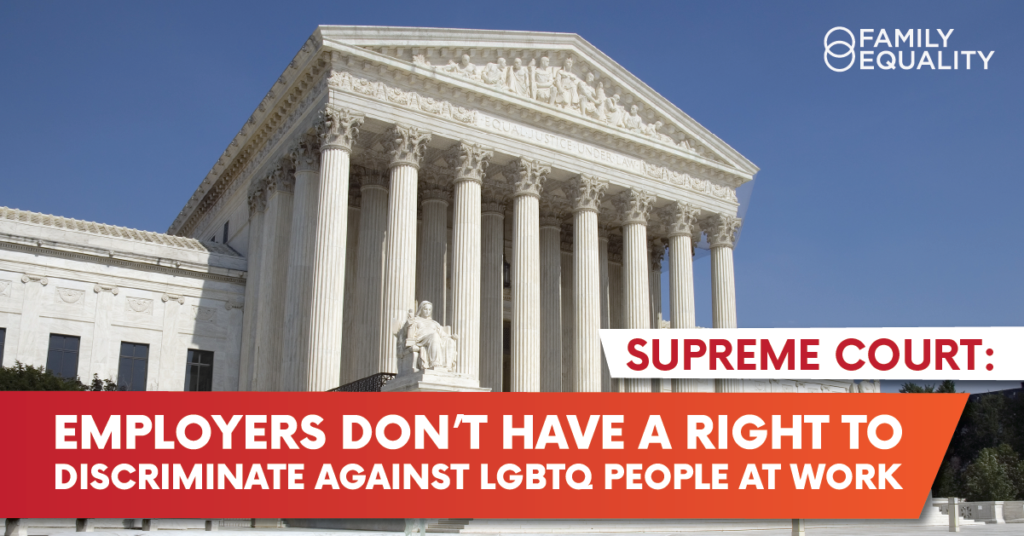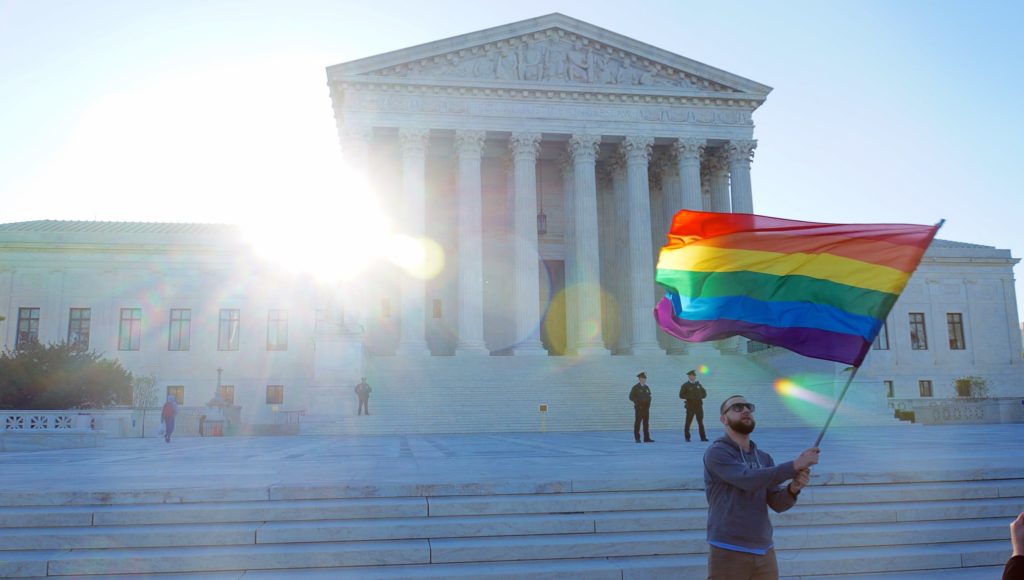Table of Contents:
Last Updated: June 16, 2020
On April 22, 2019, the Supreme Court announced it would consider three cases that ask whether or not to roll back protections for LGBTQ people under Title VII of the Civil Rights Act of 1964, which prohibits discrimination in employment on the basis of sex. The Supreme Court heard oral arguments in these cases on October 8, 2019. At the heart of these cases lie the question “does the term sex, as considered in Title VII, include sexual orientation and gender identity?”
On June 15, 2020, the Supreme Court answered that question in a 6-3 ruling, written by Justice Neil Gorsuch, with a resounding YES.
About the Cases
The U.S. Supreme Court considered three related cases and combined them all into one decision: Bostock v. Clayton County. These cases are about the existing protections LGBTQ+ people have against employment discrimination and, specifically, how Title VII’s ban on sex discrimination in the workplace protects against discrimination on the basis of sexual orientation and gender identity.
Title VII of the 1964 Civil Rights Act is the federal law that deals with protections from discrimination in employment. On its face, the law prohibits discrimination in recruiting, hiring, promoting, and other employment contexts, on the basis of certain specified characteristics: race, color, national origin, sex and religion. These protections are applicable to most, but not all, employers.
- Altitude Express v. Zarda: Don Zarda was fired after revealing his sexual orientation to a customer at the skydiving business where he worked. The U.S. Court of Appeals for the Second Circuit ruled in favor of Zarda, concluding that discrimination based on sexual orientation is a form of workplace sex discrimination that is prohibited under Title VII. Sadly, Don Zarda passed away prior to the Court’s ruling in his favor, but his surviving partner and sister continued the lawsuit on his behalf.
- Bostock v. Clayton County, GA: Gerald Bostock was fired from his job as a child welfare services coordinator for Clayton County, Georgia, when his employer learned that he is gay. The U.S. Court of Appeals for the Eleventh Circuit affirmed the lower court’s dismissal of Bostock’s Title VII case, which relied on old caselaw.
- R.G. & G.R. Harris Funeral Homes v. EEOC and Aimee Stephens: Aimee Stephens was a funeral director in Michigan. When she informed her employer that she is transgender and would come to work as a woman, consistent with her gender identity, the funeral home said that would be unacceptable and fired her. The U.S. Court of Appeals for the Sixth Circuit held that the funeral home’s actions in firing her constituted sex discrimination in violation of Title VII. Sadly, Aimee Stephens passed away just a month prior to the Supreme Court’s ruling in her favor.
Who supports LGBTQ+ nondiscrimination protections?
Nondiscrimination protections have broad public support: over 70% of Americans support them. More than 2,000 experts and organizations filed 50 amicus (“friend of the court”) briefs on the side of LGBTQ+ employees and nondiscrimination protections, reflecting the diverse majority of the country.
Family Equality’s Amicus Brief
Family Equality, along with The Trevor Project and PFLAG National, filed an amicus brief with the Supreme Court that tells the stories of LGBTQ+ individuals who suffered discrimination because of others’ views of how they should look, act, or think based on their sex. Read more about the Family Equality brief here.
What does the ruling mean?
At its most basic, the ruling in this case confirms that Title VII’s prohibition of discrimination based on an employee’s sex prohibits employers from discriminating against employees based on their sexual orientation or gender identity. The majority argues, correctly in our opinion, that it is impossible to discriminate against someone because they are gay or transgender without considering their sex. And the law prohibits them from taking sex into account in employment related decisions. As such LGBTQ+ workers will continue to be protected under our nation’s federal civil rights laws and be able to work without fear of humiliation, harassment, or discrimination.
In the Court’s words:
“Today, we must decide whether an employer can fire someone simply for being homosexual or transgender. The answer is clear. An employer who fires an individual for being homosexual or transgender fires that person for traits or actions it would not have questioned in members of a different sex. Sex plays a necessary and undisguisable role in the decision, exactly what Title VII forbids.”
Supreme Court decision in Bostock v. Clayton County, June 15, 2020
Even with this excellent ruling, passage of the Equality Act is essential to ensure comprehensive nondiscrimination protections for LGBTQ+ Americans in all areas of life, including housing, public accommodations, and government programs.
Additional Resources

It’s Time to Pass the Equality Act
Take action! Demand that the Senate pass the Equality Act


